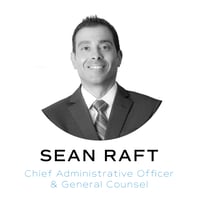One question I often get while talking with our investors and prospective investors is about our leadership team. Understandably, they want to know who all is guiding this ship.
I love getting this question because I love answering it. So let me tell you a bit about my four partners.
When I started Urban Catalyst, my plan was to create an All-Star Team of downtown San Jose developers, and that's exactly what I did by bringing on Josh Burroughs and Paul Ring. I've known both Josh and Paul for over a decade and they've had fantastic careers building projects in the downtown area.
 Josh is our Chief Operating Officer. For 10 years before he joined Urban Catalyst, he was a lead developer at SWENSON, where Josh managed the firm’s downtown San Jose portfolio, which is quite extensive. He got experience building a variety of different asset classes and project types, from student housing to market-rate multi-family apartments to senior living, office and retail. In all, Josh has acquired and entitled over 5 million square feet of product in Northern California, including over 1,500 residential units in Opportunity Zones. It’s amazing he’s had time to do all that given his community involvement; he’s currently on the Bellarmine Alumni Council, PATH San Jose Advisory Board, Downtown Association Board of Directors, Urban Confluence Silicon Valley Advisory Board--the list goes on and on.
Josh is our Chief Operating Officer. For 10 years before he joined Urban Catalyst, he was a lead developer at SWENSON, where Josh managed the firm’s downtown San Jose portfolio, which is quite extensive. He got experience building a variety of different asset classes and project types, from student housing to market-rate multi-family apartments to senior living, office and retail. In all, Josh has acquired and entitled over 5 million square feet of product in Northern California, including over 1,500 residential units in Opportunity Zones. It’s amazing he’s had time to do all that given his community involvement; he’s currently on the Bellarmine Alumni Council, PATH San Jose Advisory Board, Downtown Association Board of Directors, Urban Confluence Silicon Valley Advisory Board--the list goes on and on.
 Before joining Urban Catalyst, Paul was the head developer at The Core Companies, where he worked for 15 years focusing on multi-family below-market-rate housing in downtown San Jose. I had the pleasure of working with Paul as a joint venture partner on two multi-family projects here in the downtown area. I really liked his style and loved watching him manage his team, and so we brought him on to be our Executive Vice President of Development and Construction. Now he manages our 15-person team of development and construction professionals that build all of our projects. Paul is great at finding creative solutions that add value for investors and the community, one example being the Agrihood project that recently broke ground.
Before joining Urban Catalyst, Paul was the head developer at The Core Companies, where he worked for 15 years focusing on multi-family below-market-rate housing in downtown San Jose. I had the pleasure of working with Paul as a joint venture partner on two multi-family projects here in the downtown area. I really liked his style and loved watching him manage his team, and so we brought him on to be our Executive Vice President of Development and Construction. Now he manages our 15-person team of development and construction professionals that build all of our projects. Paul is great at finding creative solutions that add value for investors and the community, one example being the Agrihood project that recently broke ground.
 Of course, we’re not just developers; we’re also fund managers, which brings me to Morgan Mackles. Morgan and I have known each other for over 25 years. We've been really close friends ever since we went to high school together, including 10 years playing in a cheesy rock band together. Morgan has spent his career building scalable and repeatable sales processes. You can see an example of his methodology in a guest blog post he did for WorkBench Ventures here. He's done it for big companies and small companies, startups, all the way up to Fortune 500 companies, and he's the primary reason why we were so successful in our Fund I fundraise, raising $131 million.
Of course, we’re not just developers; we’re also fund managers, which brings me to Morgan Mackles. Morgan and I have known each other for over 25 years. We've been really close friends ever since we went to high school together, including 10 years playing in a cheesy rock band together. Morgan has spent his career building scalable and repeatable sales processes. You can see an example of his methodology in a guest blog post he did for WorkBench Ventures here. He's done it for big companies and small companies, startups, all the way up to Fortune 500 companies, and he's the primary reason why we were so successful in our Fund I fundraise, raising $131 million.
 Last, but certainly not least, Sean is our Chief Administrative Officer and General Counsel, and he's just a really impressive person in general. Sean started his career as a public defender and was the 2009 recipient of the Don Sims Trial Attorney of the Year Award, if that's any indication of what kind of work ethic he has. Sean manages our financial consultants, our fund administrator, our legal team and our accountants that do our tax and audit. Sean is also on the national working group that advises the U.S. Treasury and the IRS of any ongoing Opportunity Zone Fund clarifications, and Sean does all of our compliance with the SEC and with the Opportunity Zone rules and regulations. An easy way to say it is this: Sean dots the I’s and crosses the T’s here at Urban Catalyst. Sean’s expertise was on display when he delivered this very well-received webinar for the CPA Academy.
Last, but certainly not least, Sean is our Chief Administrative Officer and General Counsel, and he's just a really impressive person in general. Sean started his career as a public defender and was the 2009 recipient of the Don Sims Trial Attorney of the Year Award, if that's any indication of what kind of work ethic he has. Sean manages our financial consultants, our fund administrator, our legal team and our accountants that do our tax and audit. Sean is also on the national working group that advises the U.S. Treasury and the IRS of any ongoing Opportunity Zone Fund clarifications, and Sean does all of our compliance with the SEC and with the Opportunity Zone rules and regulations. An easy way to say it is this: Sean dots the I’s and crosses the T’s here at Urban Catalyst. Sean’s expertise was on display when he delivered this very well-received webinar for the CPA Academy.
You can see why I’m really proud of this team. Combined, the five partners have built over $5 billion worth of projects in Silicon Valley, with a heavy concentration in downtown San Jose.
And the talent at Urban Catalyst extends all the way down the org chart. We’ve built a great organization and, working with our investors, we’re committed to helping revitalize a great city.
Contact us today to learn more about our Fund II.
Important Disclosures
The contents of this communication: (i) do not constitute an offer of securities or a solicitation of an offer to buy securities, (ii) offers can be made only by the confidential Private Placement Memorandum (the “PPM”) which is available upon request, (iii) do not and cannot replace the PPM and is qualified in its entirety by the PPM, and (iv) may not be relied upon in making an investment decision related to any investment offering by an issuer, or any affiliate, or partner thereof ("Issuer").
All potential investors must read the PPM and no person may invest without acknowledging receipt and complete review of the PPM.
With respect to any performance levels outlined herein, these do not constitute a promise of performance, nor is there any assurance that the investment objectives of any program will be attained. All investments carry the risk of loss of some or all of the principal invested. Assumptions are more fully outlined in the Offering Documents/ PPM for the respective offering. Consult the PPM for investment conditions, risk factors, minimum requirements, fees and expenses and other pertinent information with respect to any investment.
These investment opportunities have not been registered under the Securities Act of 1933 and are being offered pursuant to an exemption therefrom and from applicable state securities laws. All offerings are intended only for accredited investors unless otherwise specified.
Past performance are no guarantee of future results. All information is subject to change. You should always consult a tax professional prior to investing. Investment offerings and investment decisions may only be made on the basis of a confidential private placement memorandum issued by Issuer, or one of its partner/issuers. Issuer does not warrant the accuracy or completeness of the information contained herein. Thank you for your cooperation.
Real Estate Risk Disclosure:
- There is no guarantee that any strategy will be successful or achieve investment objectives including, among other things, profits, distributions, tax benefits, exit strategy, etc.;
- Potential for property value loss – All real estate investments have the potential to lose value during the life of the investments;
- Change of tax status – The income stream and depreciation schedule for any investment property may affect the property owner’s income bracket and/or tax status. An unfavorable tax ruling may cancel deferral of capital gains and result in immediate tax liabilities;
- Potential for foreclosure – All financed real estate investments have potential for foreclosure;
- Illiquidity – These assets are commonly offered through private placement offerings and are illiquid securities. There is no secondary market for these investments.
- Reduction or Elimination of Monthly Cash Flow Distributions – Like any investment in real estate, if a property unexpectedly loses tenants or sustains substantial damage, there is potential for suspension of cash flow distributions;
- Impact of fees/expenses – Costs associated with the transaction may impact investors’ returns and may outweigh the tax benefits
- Stated tax benefits – Any stated tax benefits are not guaranteed and are subject to changes in the tax code. Speak to your tax professional prior to investing.
Opportunity Zone Disclosures
- Investing in opportunity zones is speculative. Opportunity zones are newly formed entities with no operating history. There is no assurance of investment return, property appreciation, or profits. The ability to resell the fund’s underlying investment properties or businesses is not guaranteed. Investing in opportunity zone funds may involve a higher level of risk than investing in other established real estate offerings.
- Long-term investment. Opportunity zone funds have illiquid underlying investments that may not be easy to sell and the return of capital and realization of gains, if any, from an investment will generally occur only upon the partial or complete disposition or refinancing of such investments.
- Limited secondary market for redemption. Although secondary markets may provide a liquidity option in limited circumstances, the amount you will receive typically is discounted to current valuations.
- Difficult valuation assessment. The portfolio holdings in opportunity zone funds may be difficult to value because financial markets or exchanges do not usually quote or trade the holdings. As such, market prices for most of a fund’s holdings will not be readily available.
- Capital call default consequences. Meeting capital calls to provide managers with the pledged capital is a contractual obligation of each investor. Failure to meet this requirement in a timely manner could elicit significant adverse consequences, including, without limitation, the forfeiture of your interest in the fund.
- Opportunity zone funds may use leverage in connection with certain investments or participate in investments with highly leveraged capital structures. Leverage involves a high degree of financial risk and may increase the exposure of such investments to factors such as rising interest rates, downturns in the economy or deterioration in the condition of the assets underlying such investments.
- Unregistered investment. As with other unregistered investments, the regulatory protections of the Investment Company Act of 1940 are not available with unregistered securities.
- It is possible, due to tax, regulatory, or investment decisions, that a fund, or its investors, are unable realize any tax benefits. You should evaluate the merits of the underlying investment and not solely invest in an opportunity zone fund for any potential tax advantage.
The above material cannot be altered, revised, and/or modified without the express written consent of Urban Catalyst.


